|
|
|
Sort Order |
|
|
|
Items / Page
|
|
|
|
|
|
|
| Srl | Item |
| 1 |
ID:
087358


|
|
|
|
|
| Publication |
2009.
|
| Summary/Abstract |
This paper examines the role of identity in shaping counter-terrorism policy in Canada. We show that identity functions in three ways: constitutively by defining the range of choices a state is likely to consider; strategically by being a resource to buttress arguments based in economic or sovereignty interests; and heuristically by using identity as a marker for risk. This three-faceted explanation helps explain why, despite close economic, social, and political links between Canada and the United States which might lead us to expect Canada to follow American counter-terrorism policy, Canadian counter-terrorism policy often diverges from the American lead.
|
|
|
|
|
|
|
|
|
|
|
|
|
|
|
|
| 2 |
ID:
131065
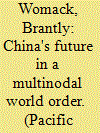

|
|
|
|
|
| Publication |
2014.
|
| Summary/Abstract |
Over the next twenty years China is likely to become the world's largest national economy, though not the richest one-fifth of the world's population. Chinese demographic power will be qualitatively different from American technological power despite bottom-line similarities in GNP, and China will face challenges of political and economic sustainability. Assuming that globalization, constrained state sovereignty, and demographic revolution continue as basic world trends, the world order is likely to be one in which concerns about conflicts of interests drive interactions, but no state or group of states is capable of benefitting from unilaterally enforcing its will against the rest. Thus, there is no set of "poles" whose competition or cooperation determines the world order, despite the differences of exposure created by disparities in capacity. Although the United States and China will be the primary state actors and their relationship will contain elements of rivalry as well as cooperation, the prerequisites of Cold War bipolarity no longer exist. Rather, the order would be best described as "multinodal," a matrix of interacting, unequal units that pursue their own interests within a stable array of national units and an increasing routinization of international regimes and interpenetrating transnational connections
|
|
|
|
|
|
|
|
|
|
|
|
|
|
|
|
| 3 |
ID:
186333
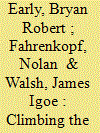

|
|
|
|
|
| Summary/Abstract |
Why do some states possess more advanced military technologies than others? Our study explores the vertical proliferation of land-attack cruise missiles (LACMs), seeking to understand which demand- and supply-side factors best explain why some countries acquire more sophisticated LACMs. We theorize that states’ security environments, regime types, possession of related strategic technologies, and membership in the Missile Technology Control Regime (MTCR) influence the possession of more sophisticated cruise missiles. Our analysis employs a unique new global dataset with granular data on every LACM national militaries have deployed. We use this dataset to evaluate the proliferation of LACMs across the international system from 1991–2015. Using a selection model that first controls for the horizontal proliferation of LACMs, we find that insecurity, scientific and technical expertise from related technologies, the possession of highly authoritarian and highly democratic regimes, and MTCR membership all have positive effects on the sophistication of LACM-possessors’ arsenals.
|
|
|
|
|
|
|
|
|
|
|
|
|
|
|
|
| 4 |
ID:
168278
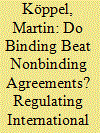

|
|
|
|
|
| Summary/Abstract |
Does the form of a multilateral agreement (MEA) by itself improve environmental performance? In particular, do legally nonbinding MEAs pose a rival to the effect of more traditional legally binding international agreements? Our theory builds on the legal and international regimes literatures and postulates that legally binding agreements (LBAs) have more benign effects on water quality than legally nonbinding agreements (LNBAs). We probe two operationalizations of the form of MEAs. First, we purely focus on the form: of legally binding versus legally nonbindings. Second, we combine the form of an agreement each with an index of precision and an index of delegation. The empirical focus is on upstream–downstream water quality in Europe during 1990 to 2007. Our regression analyses, regardless of specification, find that LBAs beat LNBAs and that LBAs with high degrees of precision and delegation beat the effect of any other configuration of agreements with respect to enhancing water quality.
|
|
|
|
|
|
|
|
|
|
|
|
|
|
|
|
| 5 |
ID:
185994


|
|
|
|
|
| Summary/Abstract |
The regime built around the 1970 Treaty on the Non-Proliferation of Nuclear Weapons (NPT) has helped curtail the spread of nuclear arms for fifty years. In hindsight, it is remarkable only nine states possess the world’s most powerful weapon. The NPT achieved much success during Cold War bipolarity and U.S. unipolarity in its aftermath. But today, China’s rise and Russia’s resurgence have ushered in a new era of emerging multipolarity. Can the treaty withstand the potential challenges of this dynamic environment? There is a real risk that multipolarity may shake the scaffolding of the nonproliferation regime, presenting a significant test to the NPT’s durability. This article identifies four essential elements of the nonproliferation regime: widespread membership, adaptability, enforcement, and fairness. History suggests bipolarity and unipolarity in the international system largely sustained and promoted these NPT features. When international regimes lack such elements, it sharply curtails their long-term efficacy.
|
|
|
|
|
|
|
|
|
|
|
|
|
|
|
|
| 6 |
ID:
117855
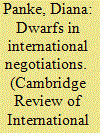

|
|
|
|
|
| Publication |
2012.
|
| Summary/Abstract |
Students of international relations interested in cooperation through international regimes and organizations very often devote their attention to the role of a few big states rather than the numerous small ones. Small states tend to possess fewer administrative and financial resources back home as well as smaller and less well-equipped delegations at the international negotiation table than big states. This can easily translate into difficulties in preparing positions for all items on the negotiation agenda and in developing negotiation strategies in great detail, which might inhibit small states from successfully influencing negotiation outcomes. Yet, since international negotiation often rest on a one-state, one-vote principle and since small states can adjust priorities and redirect their limited capacities, there is a window of opportunity for small states to turn into important international actors and achieve significant outcomes in international affairs. In order to systematically shed light on the role of small states in international negotiations, this article outlines the conceptual framework to answer the following question: How, and under which conditions, can small states successfully punch above their weight in international negotiations?
|
|
|
|
|
|
|
|
|
|
|
|
|
|
|
|
| 7 |
ID:
172829
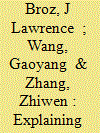

|
|
|
|
|
| Summary/Abstract |
We analyze the factors that increase the likelihood that other nations will follow China's global economic leadership. While our theoretical framework incorporates the conventional argument that China pulls in followers with economic benefits, we focus on grievances with the current global order that have the effect of pushing countries toward the rising new leader. We find that grievances about global financial instability are particularly important push factors. Our results show that countries that have experienced more financial crises, more variable capital account policies, more volatile portfolio capital outflows, and more social unrest during IMF programs are more likely to support China's global leadership than leaders of nations that have been less exposed to these problems. We find no evidence that grievances about global governance, or grievances about discriminatory US trade policies, are related to foreign support for China's global economic leadership. Overall, our evidence is consistent with the interpretation that leaders want to reform and preserve the WTO and the IMF, which have worked reasonably well for them under US leadership. At the same time, they have incentives to follow China's economic leadership on global capital flows, emphasizing long-term infrastructure and development finance over short-term flows which, under the current order, have imposed large costs on many economies.
|
|
|
|
|
|
|
|
|
|
|
|
|
|
|
|
| 8 |
ID:
081552
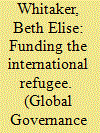

|
|
|
|
|
| Publication |
2008.
|
| Summary/Abstract |
Despite the abundance of literature on international regimes, little attention has been given to how they are funded and the impact of funding on regime performance. This article examines how donor funding has affected the underlying principle of protection in the international refugee regime. It focuses on the case of Tanzania, where refugee protection standards have declined consistently over the past twelve years, and argues that a shortage of funding within the regime has contributed to the shift in government policy in several ways. To the extent that funding cuts have had an influence on declining protection standards, this case suggests that resource shortages may cause practice within an international regime to become inconsistent with its underlying principles, thus weakening the overall regime
|
|
|
|
|
|
|
|
|
|
|
|
|
|
|
|
| 9 |
ID:
155501
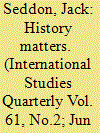

|
|
|
|
|
| Summary/Abstract |
A central point of disagreement animates global governance research. Some scholars see changing forms of global governance as eroding the power of the state. Others reject this claim, arguing that relative state power remains the most important factor in international affairs. I contend that analytical misconception confounds and misleads this debate. Both sides insist on modeling the state as a unitary actor; further, both neglect the temporal dynamics of international regime formation. I build an analytical framework that focuses on political processes that unfold over time and opens up the unitary state. Probing three decades of innovation in global finance, trade, and environmental governance, I find no evidence of a zero-sum relationship. In fact, experimental forms of transnational governance often empower governmental actors and state agencies. However, I also conclude that relative organizational power grounded in historical processes of regime formation matters more than relative state power in shaping global regulatory change.
|
|
|
|
|
|
|
|
|
|
|
|
|
|
|
|
| 10 |
ID:
145681
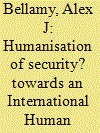

|
|
|
|
|
| Summary/Abstract |
Over the past few decades, genocidal killing and other mass atrocities have become less frequent and less lethal. At the same time, collective international responses have become more common and more comprehensive. What explains these two phenomena, and are they connected? This article suggests that the evidence of declining mass violence and growing international activism is not only compelling but that the two phenomena are connected by the emergence of a new international human protection regime. The article proceeds in three parts. The first examines the evidence for thinking that the world is experiencing both a decline in mass violence and an increase in international activism in response to such violence. The second outlines the emergence, scope, and limits of the human protection regime. The third considers whether the regime itself is associated with the changing practices of third parties to mass violence. The fourth part contrasts this explanation with potential alternatives.
|
|
|
|
|
|
|
|
|
|
|
|
|
|
|
|
| 11 |
ID:
057416
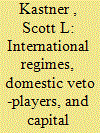

|
|
|
| 12 |
ID:
149709
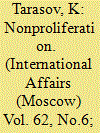

|
|
|
|
|
| Summary/Abstract |
Effects of the transformation of the international relations system at the end of the 20th and the beginning of the 21st century have included changes in the character of global security threats. The emergence of a black market for nuclear materials, information and technologies and the possibility of extremist networks getting hold of nuclear weapons are among new sources of danger.
|
|
|
|
|
|
|
|
|
|
|
|
|
|
|
|
| 13 |
ID:
185993
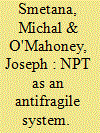

|
|
|
|
|
| Summary/Abstract |
We introduce “antifragility” as a conceptual framework to understand the impact of occasional violations of regime norms on the health of respective regimes. Contrary to the prevailing understanding of norm violation as a strictly negative phenomenon that leaves regimes damaged, we show that normative deviance is, under certain conditions, a stressor that helps predominantly antifragile systems learn, improve, and adapt to changes in both internal and external environments. We apply this conceptual framework to the case of the NPT regime and the prominent violations of its nonproliferation norms by India in the 1970s (as a “contestation from outside”) and Iraq in the 1990s (as a “contestation from within”). Our findings question the prevailing catastrophizing narrative about the strictly negative impact of norm violations on regime stability and contribute to contemporary scholarly debates about norm dynamics within the NPT.
|
|
|
|
|
|
|
|
|
|
|
|
|
|
|
|
| 14 |
ID:
159151
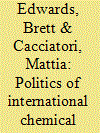

|
|
|
|
|
| Summary/Abstract |
There has been near-universal condemnation of the use of chemical weapons in the Syrian conflict. The international community has nevertheless struggled to make progress on holding the perpetrators to account. This article reviews developments at the international level in terms of Syrian chemical weapon justice between 2011 and 2017. It argues that there have been substantive disagreements between states on the rationale and means of justice in the Syrian case. It also argues that international initiatives have been tightly intertwined with developments in chemical disarmament and conflict resolution processes as well as the broader war. The article describes progress and challenges to chemical weapon justice in a number of distinct formal international mechanisms during the period studied. The analysis concludes by contextualizing international responses—including the U.S. tomahawk strikes against a Syrian airbase—to the Khan Shaykhun chemical attacks of April 2017.
|
|
|
|
|
|
|
|
|
|
|
|
|
|
|
|
| 15 |
ID:
123688
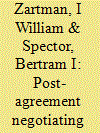

|
|
|
|
|
| Publication |
2013.
|
| Summary/Abstract |
AbstractThis thematic issue of the journal revisits the thesis introduced ten years ago in the book, Getting It Done: Post-Agreement Negotiation and International Regimes, that regimes are recursive negotiations and not merely one-off settlements that turn next to ratification. Seven cases are presented in the issue and discussed in this article that develop a number of reasons why regimes are marked by post-agreement negotiations. They examine the dimensions of these different types of encounters, all negotiations to be explored by established negotiation analysis but incomplete and incomprehensible without the context of the previous agreement, which then they complement.
|
|
|
|
|
|
|
|
|
|
|
|
|
|
|
|
| 16 |
ID:
147697
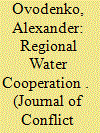

|
|
|
|
|
| Summary/Abstract |
Shared water has prompted some neighboring countries to form integrated regional institutions and rules. Other neighboring countries have maintained less cooperative policies in managing shared water. When do governments achieve integrated management of regional water? How do they overcome barriers to integrated cooperation? This article contends that the structure of interdependence, not the number of states bordering the water, encourages different international policies. It analyzes original panel data on the agreement histories of seventy-six rivers, lakes, and seas. It also examines the role of selective incentives in promoting mutual water management. Fundamentally, the number of states with access to the water does not determine the fate of water management. Strategies for overcoming divergent preferences can be applied across situations. The key is to provide selective incentives when states are asymmetrically interdependent in using the water, to alter national preferences. Selective incentives are particularly important when few states share the water.
|
|
|
|
|
|
|
|
|
|
|
|
|
|
|
|
| 17 |
ID:
133743
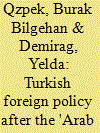

|
|
|
|
|
| Publication |
2014.
|
| Summary/Abstract |
This article explores Turkey's changing foreign policy approach towards the Middle East after the spread of the Arab upheavals to Syria. Instead of preserving the status quo, Ankara has turned to a revisionist state that has begun to threaten Middle Eastern governments. While Turkey was reluctant to join the foreign military interventions against Middle Eastern regimes, (e.g. Libya) it has been instrumental in immersing NATO in the Syrian civil war. Such transformation ultimately undermines analyses that define Turkey as the kingmaker of the Middle East.
|
|
|
|
|
|
|
|
|
|
|
|
|
|
|
|
| 18 |
ID:
173455
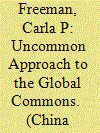

|
|
|
|
|
| Summary/Abstract |
This study assesses China's approach to the global commons, those areas of the globe over which no state exercises sovereignty and that are accessible to all. Examining Chinese behaviour, official statements and expert positions towards the extant high seas and outer space regimes, this research concludes that China approaches the principle of international access to the two domains situationally, reflecting its assessment of how these regimes affect its national interests. The finding cautions against blanket characterizations of China's strategic orientation towards the global commons.
|
|
|
|
|
|
|
|
|
|
|
|
|
|
|
|
| 19 |
ID:
177071
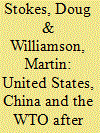

|
|
|
|
|
| Summary/Abstract |
A hegemon can destroy its international regimes, but what happens when it does not possess the capacity to reconstitute a regime to its liking? Drawing on structural power theory, our article examines President Nixon’s historic attacks on the Bretton Woods international monetary regime to help illuminate President Trump’s attacks on the World Trade Organisation (WTO). In both cases regime destruction was driven to a large extent by a desire to contain rivals: Europe for Nixon, China for Trump. Drawing on original archival material, our case study analysis shows that while the United States possessed sufficient negative structural power to derail Bretton Woods, it lacked sufficient positive structural power to create the new monetary structure Nixon wanted. Trump faces a similar dilemma: he can block the WTO regime, but cannot necessarily replace it with one to the United States’ liking. China is too powerful and possesses too much structural power of its own to give up its WTO privileges without a fight. After the Coronavirus pandemic, it is unlikely that China can prevent the United States from wrecking the WTO trade regime, but very likely it can block US attempts to create a successor regime tailored exclusively to US requirements.
|
|
|
|
|
|
|
|
|
|
|
|
|
|
|
|
| 20 |
ID:
148325
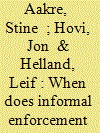

|
|
|
|
|
| Summary/Abstract |
We study experimentally how enforcement influences public goods provision when subjects face two free-rider options that roughly parallel the nonparticipation and noncompliance options available for countries in relation to multilateral environmental agreements (MEAs). Our results add to the MEA literature in two ways. First, they suggest that compliance enforcement will fail to enhance compliance in the absence of participation enforcement. Second, they indicate that compliance enforcement will boost compliance significantly in the presence of participation enforcement. Our results also add to the experimental literature on public goods provision, again in two ways. First, they reveal that previous experimental findings of enforcement boosting cooperation are valid only in settings with forced (or enforced) participation. Second, they show that subjects’ willingness to allocate costly punishment points is significantly stronger when the enforcement system permits punishment of both types of free riding than when it permits punishment of only one type.
|
|
|
|
|
|
|
|
|
|
|
|
|
|
|
|
|
|
|
|
|